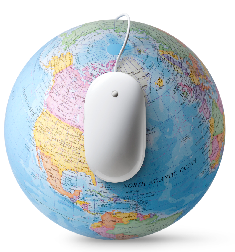Over 50% of the global population will have Internet access within three years’ time, with mobile broadband over  smartphones and tablets now the fastest growing technology in human history, according to the 2014 edition of the State of Broadband report.
smartphones and tablets now the fastest growing technology in human history, according to the 2014 edition of the State of Broadband report.
Released today in New York at the 10th meeting of the Broadband Commission for Digital Development, the report reveals that more than 40% of the world’s people are already online, with the number of Internet users rising from 2.3 billion in 2013 to 2.9 billion by the end of this year.
Over 2.3 billion people will access mobile broadband by end 2014, climbing steeply to a predicted 7.6 billion within the next five years. There are now over three times as many mobile broadband connections as there are conventional fixed broadband subscriptions. The popularity of broadband-enabled social media applications continues to soar, with 1.9 billion people now active on social networks.
Produced annually by the Broadband Commission, The State of Broadband is a unique global snapshot of broadband network access and affordability, with country-by country data measuring broadband access against key advocacy targets set by the 54 members of the Broadband Commission.
The Republic of Korea continues to have the world’s highest household broadband penetration at over 98%, up from 97% last year. Monaco now surpasses last year’s champion, Switzerland, as the world leader in fixed broadband penetration, at over 44% of the population. There are now four economies (Monaco, Switzerland, Denmark, Netherlands) where penetration exceeds 40%, up from just one (Switzerland) in 2013.
The US ranks 19th globally in terms of number of people online, ahead of other OECD countries like Germany (20th) and Australia (21st), but behind the United Kingdom (12th), Japan (15th) and Canada (16th). The US has slid from 20th to 24th place for fixed broadband subscriptions per capita, just behind Japan but ahead of Macao (China) and Estonia.
A number of MENA countries are in the top 20 for people online, including Bahrain (11th), UAE (13th) and Qatar (17th). Qatar is recorded as having the second highest percentage of household broadband (96.4%) of any developing country after Korea. It also ranks third out of developing countries for percentage of individuals using the Internet.
Other nations, such as Jordan (87), Tunisia (90th) and Iraq (157th) still have a significant way to go, with less than 50% of the population online.
In total, there are now 77 countries where over 50% of the population is online, up from 70 in 2013. The top ten countries for Internet use are all located in Europe, with Iceland ranked first in the world with 96.5% of people online. The lowest levels of Internet access are mostly found in sub-Saharan Africa, with Internet available to less than 2% of the population in Ethiopia (1.9%), Niger (1.7%), Sierra Leone (1.7%), Guinea (1.6%), Somalia (1.5%), Burundi (1.3%), Eritrea (0.9%) and South Sudan (no data available). The list of the ten least-connected nations also includes Myanmar (1.2%) and Timor Leste (1.1%).
